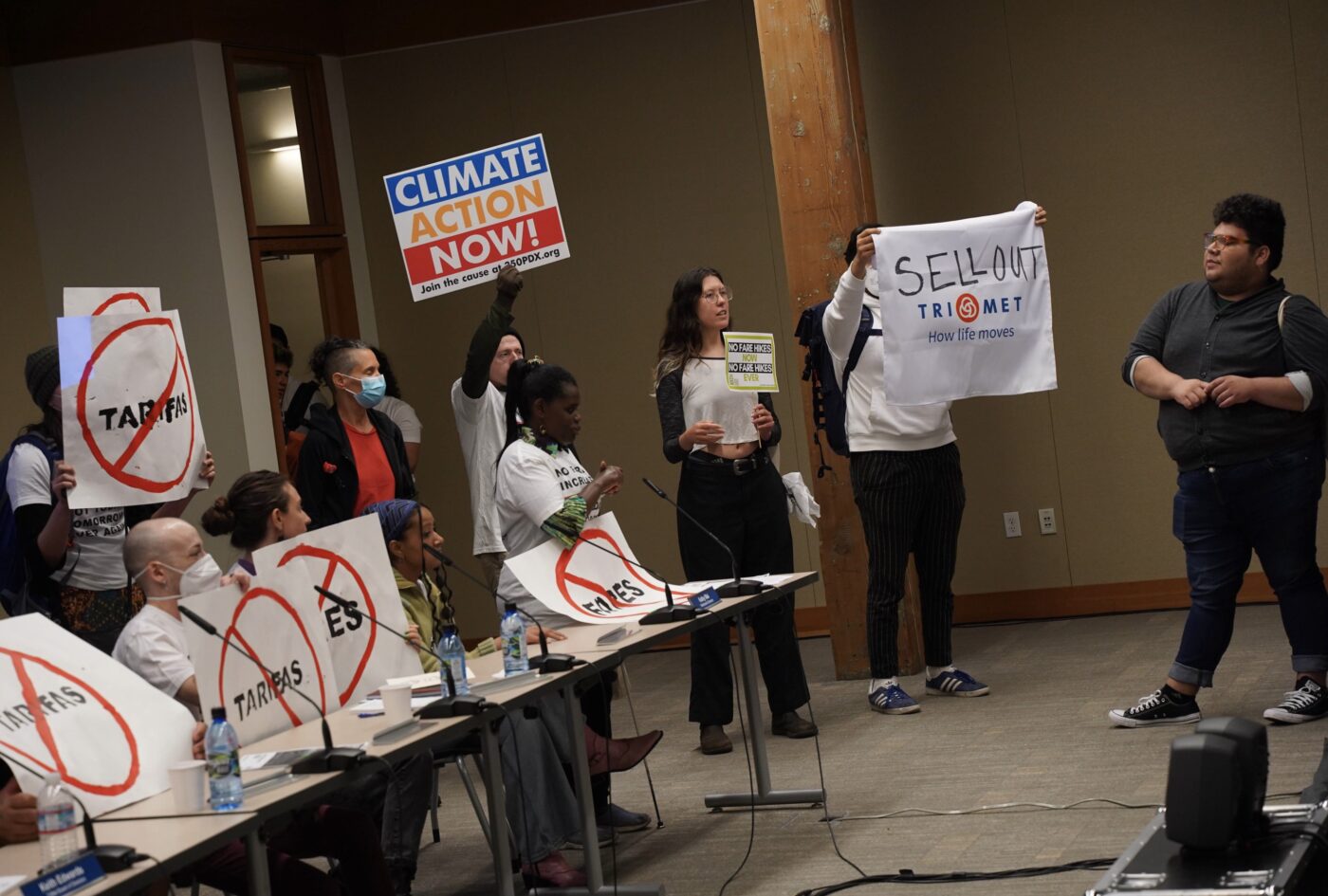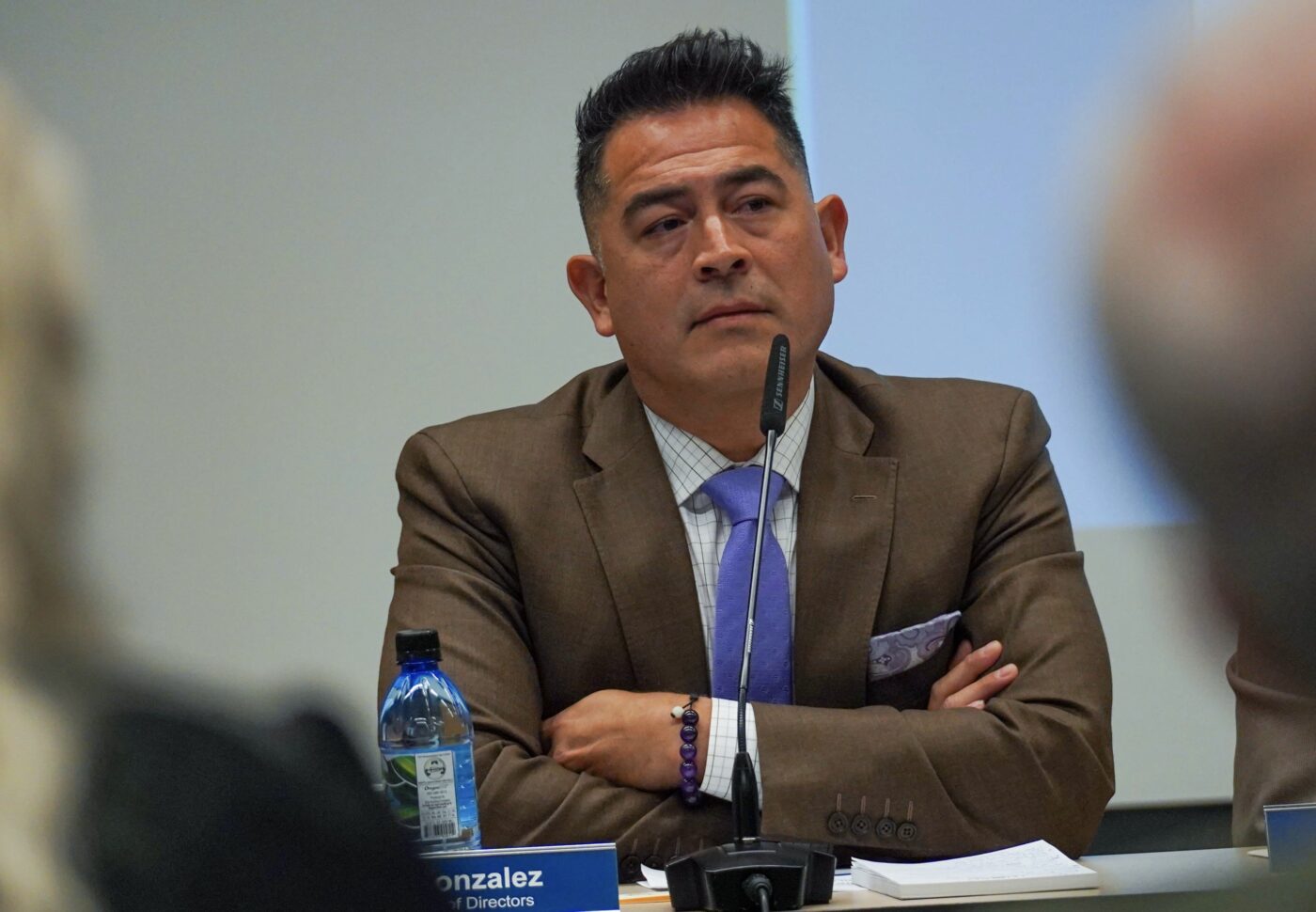“I get scared that they’re creating a pathway where any organization with a 501(c)(3) status can start utilizing programs to crowd out a public forum with a position.”
– Ozzie Gonzalez, TriMet Board member
A member of the TriMet Board of Directors has doubled-down on serious allegations against a Portland-based transit advocacy nonprofit that were first made public at a board meeting last month.
TriMet Board Secretary and Treasurer Ozzie Gonzalez was appointed to his position by Oregon Governor Kate Brown in 2018. Late last month he voted along with five other board members to raise transit fares by 30-cents. Before doing so, Gonzalez delivered a speech about why he believed the fare increase was the right move. He also went out of his way to sharply criticize OPAL Environmental Justice Oregon, a nonprofit that organized a rally and protest against it.
Gonzalez expressed not only his disagreement with OPAL’s advocacy style, he accused them of tokenization, of paying people to testify, and he directly questioned whether their tactics ran afoul of nonprofit lobbying rules. “We’re confusing democracy by having paid advertising brought to the public forum,” he said during the meeting. “And I believe that anybody who’s a tax exempt organization needs to be very careful when they’re leaning into tax policy in this way.”
Gonzalez then expanded his criticisms in tweets from the bus on his way home from the meeting:
“It’s a dark day for democracy when special interests pay people to disrupt meetings. Buying t-shirts, making signs, paying stipends, & Tokenizing youth, POC [people of color] and disabled people for political gain is gross! And many [of the meeting attendees] were paid over $700 a pop to show up and make a spectacle for cameras being told this will affect them. Low income riders and frequent riders are now getting a BIGGER subsidy, but truth matters little to paid activists looking for a spectacle.”
These accusations are based on what Gonzalez saw and heard at TriMet’s board meetings in April and May. His assertions about people being paid comes from OPAL’s Seeding our Liberation program. That 12-week leadership development program (which began in March) paid participants $2,160 over three months ($720 per month) and required them to attend weekly educational workshops and testify at three TriMet board meetings (the last one being the fare increase vote on May 24th). Participants were also required to testify and/or take part in some sort of activism effort at least four times in the three months.
Given a chance to respond to Gonzalez’s tweet, OPAL wrote to BikePortland via email: “We find the accusations Gonzalez made immediately after the TriMet Board Meeting deeply disturbing and unfounded. We view his tweet as trolling and we do not feel it is necessary to respond to this behavior directly.”
OPAL has pushed TriMet for a fareless transit system for years. In 2019 a few TriMet board members appeared to briefly consider the idea; but there’s never been support for the idea from TriMet’s top leadership. For his part, Gonzalez says he agrees with OPAL that a fareless system would be ideal (he often frames the issue as “our cause”). What he objects to is how OPAL goes about making it happen. The way Gonzalez sees it, OPAL is more concerned with “trying to get a base riled up” than making progress.
In a phone call after the May 24th meeting, Gonzalez said OPAL has had many opportunities to help TriMet achieve lower and/or free fares. “For years I’ve seen OPAL present demands at the [Transit Equity Advisory Committee, TEAC], then utilize it to say nothing when it’s time to discuss ideas and solutions,” he said. “There’s an overwhelming emphasis on making sure that the pageantry looks like they’re championing a cause; but when it comes time to do the work, and actually affect the change, that’s not quite as important.”
Central to Gonzalez’s beef with OPAL is that they are a partner of TriMet. He says the group is paid to sit on the TEAC and to help the agency do community outreach (I’m working to clarify the nature of this financial partnership and will update this post when I learn more). “If you’re paid by an organization and you’re helping lead demonstrations where the premise is disruption, I would certainly like to have them come and explain how that will help advance our goals.”
“The heckling at the meeting this month was coming from voices [leaders of OPAL] that chose not to speak up during the public forum and have chosen to stay silent when they’re sitting in the committee meetings that are discussing this topic,” Gonzalez continued. “To me, this is the misuse of a process and the overwhelming emphasis on pageantry and optics.”
That OPAL might be running afoul of federal tax law that puts their nonprofit status in jeopardy is Gonzalez’s most serious accusation. Nonprofits are allowed to do some lobbying, but they can lose their tax-exempt privileges if it becomes a “substantial” part of their work. OPAL’s work on the fare increase appears to fit the definition of lobbying laid out by the IRS, but it’s unclear if the money and time spent reaches the “substantial” level.
“It doesn’t feel to me like they are acting within those [legal] confines,” Gonzalez told BikePortland. “And I get scared that they’re creating a pathway where any organization with a 501(c)(3) status can start utilizing programs to crowd out a public forum with a position.”
As for his claim of tokenization, Gonzalez accused OPAL of “throwing folks into a process that they have been under-informed about” and not giving them complete or accurate information about the issue. At the two most recent board meetings about the fare increase, Gonzalez alleges that, “Over half of the testimonials were coming in with a script in hand from an organization that that facilitated their arrival to that space.” (OPAL says a majority of people who testified were not affiliated with their organization.)
“Right now it feels more like our partners want to see us fail, then they want to see us succeed,” Gonzalez said at the May board meeting. Now he’s questioning whether or not TriMet should have any relationship with OPAL at all. “I don’t think they’re benefiting the cause in the grand scheme of things,” Gonzalez shared with BikePortland. “Right now, there’s just a lot of distrust and disregard for the transit system and the transit agency at-large that’s been cultivated and I don’t understand what the objective of that could be.”
I gave OPAL another opportunity to respond to what Gonzalez shared with me on the phone, but I have not yet heard back.
In their statement responding to Gonzalez’s tweet, OPAL said, “The [fare increase] vote demonstrates that the un-elected TriMet Directors are comfortable operating undemocratically in their decision-making process and moving forward with policy that inherently makes accessing and using transit in Portland more burdensome.”
Note: In a sign that this feud between OPAL and TriMet goes beyond Gonzalez and the board, this morning I received an email from TriMet Director of Communications Roberta Altstadt. Totally unsolicited and in response to our podcast, she wanted to make sure I’d seen Gonzalez’s tweet and she shared a link to OPAL’s Seeding our Liberation program website to back up his concerns.





